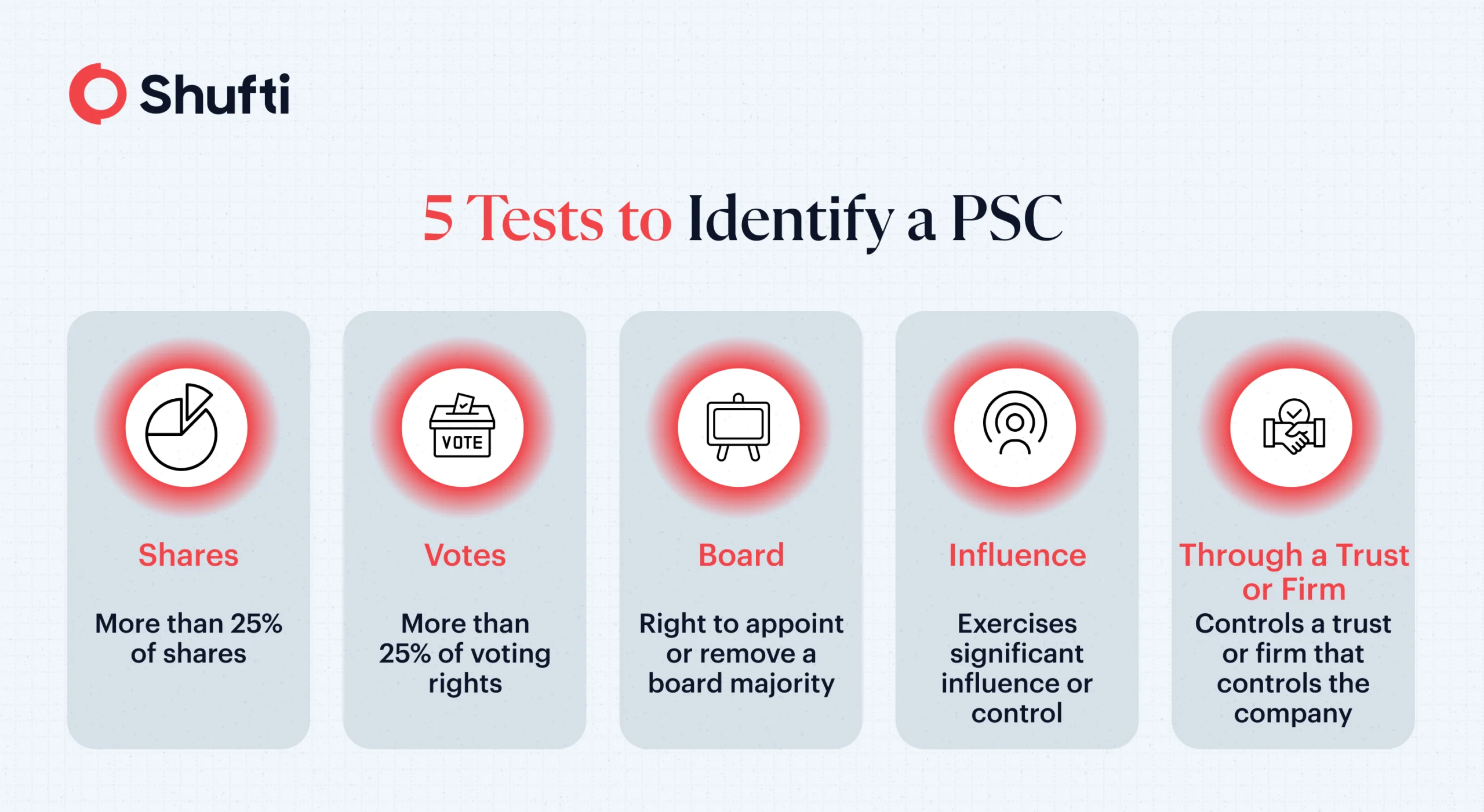What is a Person With Significant Control?

- 01 What are some PSC requirements, and what is changing?
- 02 Who qualifies as a person with significant control?
- 03 What is a ‘relevant legal entity’?
- 04 Is PSC always an individual?
- 05 What is the difference between a PSC and a director?
- 06 What is PSC compliance for companies?
- 07 How to identify and record PSCs?
- 08 Why does the PSC Register even matter?
- 09 How does technology help businesses maintain PSC compliance?
- 10 Why is PSC due diligence necessary for sanctions and AML compliance?
- 11 Mandatory Identity Verification for PSCs and Directors Under ECCTA
- 12 How Shufti Helps with Director and PSC Identity Verification
Opaque ownership is the oldest trick in financial crime, and without doubt the fastest way a legitimate business finds itself on the wrong side of regulators, banks, and the press. Seasoned compliance leaders understand that a Person of Significant Control register is not a formality; it serves as the control surface for enterprise risk.
When you disclose who can actually appoint boards, steer votes, or shape outcomes, either directly or through trusts and layered entities, you dismantle blind spots before they harden into sanctions breaches, onboarding failures, or stalled transactions.
The UK’s Economic Crime and Transparency Act has further raised the bar in corporate transparency with mandatory directors’ identity verification. The response should be both simple and rigorous, verifying the human, understanding the right to act, and assessing the link to control.
Understanding the PSC meaning is essential, not just for the sake of fulfilling formalities, but for building trust within the business world. PSC Compliance ensures that no one hides behind complex company structures.
What are some PSC requirements, and what is changing?
UK law requires most limited companies, limited liability partnerships (LLPs), certain Scottish partnerships, and other business types, such as UK Societas (UK SEs), to comply with PSC regulations. UK companies, UK SEs, and LLPs are required to maintain a PSC register in addition to a register of shareholders and directors, and also file it with Companies House. However, Scottish partnerships are not required to maintain a PSC register on their business premises but must file that information for the central register at Companies House. Companies whose voting shares are admitted for trading on a UK/EU regulated market, including overseas entities from some other countries are exempt from this requirement.
It is important to note that following the amendments introduced by the Economic Crime and Corporate Transparency Act (ECCTA) 2023, these requirements will change from November 18, 2025, and companies will no longer be required to maintain in-house registers for PSCs and directors. However, obligations to file details of directors and PSCs with the central register at Companies House, including to create and maintain a full register of shareholders at the registered company address, will remain enforced.
Who qualifies as a person with significant control?
Not every shareholder or owner of a company counts as a PSC. For anyone to qualify as a Person of Significant Control, at least one of the following conditions should be fulfilled.

- Has more than 25% of a company’s shares
- Controls more than 25% of the voting rights
- Can choose or remove most of the board of directors
- Directly or indirectly influences the company’s decisions
- Controls a trust or firm without “legal personality” that itself controls the company
Usually, one share carries one vote; however, based on a company’s articles of association, certain shares may carry additional or no voting rights. While assessing the qualifications for the first three conditions is relatively straightforward, determining the application of conditions 4 and 5 is complex.
To determine if a person meets the conditions of direct or indirect significant influence, the concept must first be clearly defined. Generally, it falls into two categories: one where a person has the right to exercise influence, and the second where a person actually exercises control or significant influence.
Some examples of significant influence or control include situations where a person, without being part of management, regularly directs or influences the majority of management decisions. Another example can be a person who is a former founder member of a partnership. However, their recommendations are almost always followed by partners who carry the majority of the voting rights.
When determining who has control or influence over a company, individuals such as employees and advisors, including lawyers, accountants, and consultants, are excluded. Similarly, suppliers, lenders, and regulators also don’t fall in this category.
What is a ‘relevant legal entity’?
Suppose one or more of the conditions that qualify a person as a PSC are met by a UK company, partnership, or legal entity that itself complies with the PSC requirements or maintains a PSC register. In that case, it is referred to as a relevant legal entity. It also includes companies whose voting shares are listed on a UK/EEA regulated market or on specified markets (US, Switzerland, Japan, Israel). Only the first RLE in the chain of ownership is required to be entered on the PSC register of a company.
Overseas companies that don’t fall in any of the above categories can’t be treated as an RLE. Therefore, details of persons who hold majority stakes in such overseas entities must be determined and entered on the PSC register.
Is PSC always an individual?
When the law mentions a person with significant control, it refers to an individual. However, the information to be entered on the PSC Register may not always be of an individual. This is because individuals with significant control over a company can be either “registerable” or “non-registerable”.
A person is ‘non-registrable’ if he/she own or control a company through another company which is a relevant legal entity (RLE) or at least one of the companies in the chain of ownership satisfies the definition of the relevant legal entity. In that case, only RLE details are to be entered on the PSC register.
In more complex scenarios where a person holds shares or voting rights both directly and indirectly through an RLE, the details of such an individual must be entered in the PSC register.
What is the difference between a PSC and a director?
A director is someone appointed to manage the company’s day-to-day work. A PSC, on the other hand, may not always turn up to meetings or do any paperwork. Instead, they make the big decisions through their ownership or rights.
| Comparison | Person With Significant Control | Director |
| What do they do? | Own/Control the company. | Manage the company daily. |
| Do they make big decisions? | Yes, often final say. | Usually, but answer to PSC. |
| Are they public? | Yes, listed on the PSC register. | Yes, listed as director. |
| Are they always the same? | Sometimes, but not always. | Sometimes, but not always. |
Sometimes, directors can also be the Person with Significant Control. However, that’s not always the case, especially in groups with numerous stakeholders.
What is PSC compliance for companies?
Companies that are required to ensure PSC compliance can’t choose to ignore this obligation. The following are key requirements that need to be fulfilled to ensure PSC compliance.
- Companies need to identify their PSCs.
- Write their details in a PSC register within 14 days.
- Update Companies House with this information within the next 14 days.
- Update it again if anything changes, such as a new PSC or a change to a previous detail, like a new address within the same time frame (update local register within 14 days, update Companies House within a further 14 days).
- If there are no changes, reconfirm every year with a statement.
This information includes the PSC’s name, date of birth, nationality, address, nature of control, and the date control commenced or added as PSC. The address includes both mailing and usual residential addresses. However, public disclosure of residential address is strictly prohibited.
Once a PSC is identified, the company should send a notice to that individual, asking for the required details to be entered in the register. If a person fails to respond within 30 days, the company may send a final notice with a warning that remains valid for an additional 30 days. If a person fails to provide accurate details within the stipulated period, they may face criminal charges, which could result in up to 2 years of imprisonment, a fine, or both.
How to identify and record PSCs?
Finding your PSCs begins with examining ownership and voting rights. But it’s not always that simple. Some PSCs might control things through family members, trusts, or other companies. You need to:
- Review all shareholding and rights agreements
- Look at votes, board powers, and special vetoes
- Confirm details with every PSC you find
- Store everything in the register and keep it updated
Even if no one meets the PSC criteria, the company must clearly record this in its PSC register. This statement must also be reported to Companies House to comply with legal requirements.
Why does the PSC Register even matter?
So, what is PSC in business world? It’s about trust. If nobody knows who holds the real power, it’s easy for people to hide illegal activities or avoid taxes. PSC compliance helps close these loopholes and brings transparency to a business’s ownership and dealings.
When all companies openly list their PSCs, investors and the general public can see who controls each business. Maintaining PSC compliance benefits a business in many ways, from smoother banking transactions, faster onboarding, to quicker and more favorable decisions on investments and lending requests.
These PSC databases are key for company verification, company screening, and fighting money laundering. Companies are required to make it available for the general public without any fees. The register helps:
- Prove the company is being run openly and honestly
- Give confidence to banks, partners, and investors
- Support AML rules and help catch financial crime
- Facilitate company verification and company screening
The purpose is to ensure these records are accessible for regulators, law enforcement, and any other interested parties upon request.
How does technology help businesses maintain PSC compliance?
Technology makes staying compliant with PSC requirements much easier. Modern tools can help businesses of any size verify PSC information, identify issues, and expedite compliance reviews. This means checks go faster, with fewer mistakes and missed deadlines.
Companies can utilize digital platforms to manage their own records, set reminders, and conduct verification, all without relying on paper or manual processes. This approach helps protect the business and keeps everything up to date.
Why is PSC due diligence necessary for sanctions and AML compliance?
PSC compliance is all about transparency and fairness in business dealings and ownership structures. Transparency makes it difficult for criminals to exploit companies to carry out their illicit activities without being disclosed. For example, without transparency laws, a person running an illegal drug business can send profits overseas by using a legal entity without ever disclosing himself as the owner. PSC registers help in conducting:
- Know Your Customer (KYC) checks
- Anti-Money Laundering (AML) processes
- Risk checks for new investors, partners, or buyers
If a company cannot provide this information or its PSC records are incorrect, it’s a red flag for business partners. That’s why digital company verification and company screening services are experiencing rapid growth. Company verification is also a crucial element of the Know Your Business or KYB process, where details of the company are cross-referenced against the official databases to check their validity.
Mandatory Identity Verification for PSCs and Directors Under ECCTA
The Economic Crime and Corporate Transparency Act (ECCTA) 2023 introduced identity verification requirements for PSCs and directors. As of November 18, 2025, identity verification will be mandatory for new directors and PSCs, followed by a transition period for existing PSCs. Identity Verification can be done through GOV.UK portal or through an authorized corporate service provider (ACSP). Only firms or professionals whose activities are supervised under the AML laws can register as ACSP, such as company formation service providers, accountants, and legal professionals.
How Shufti Helps with Director and PSC Identity Verification
Shufti offers a comprehensive suite of IDV solutions that can be customized and tailored to meet the level of assurance and security required by your business, as well as the preferences of your clients, ensuring an unobstructed and convenient onboarding experience. This is particularly important for company formation service providers when verifying the identities of their high-value clients, like PSCs and company directors.
Shufti is already providing API driven UBO verification to FinTechs and firms that require legal entity verification across the UK, through official databases for seamless onboarding of business clients.
Verify PSCs and directors fast with Shufti—book a demo to streamline ECCTA-ready identity checks and company verification.
Frequently Asked Questions
What is the difference between UBO and PSC?
A UBO is anyone who owns or controls a company. In the UK, a PSC is a UBO who meets certain legal criteria.
Who qualifies as a PSC?
Anyone with more than 25% of shares, more than 25% of voting rights, power to hire or remove most directors, or strong influence over company plans.
What is a PSC register?
It’s a list that shows the main people (or companies) in control. Companies must keep it up to date and share it with Companies House.










